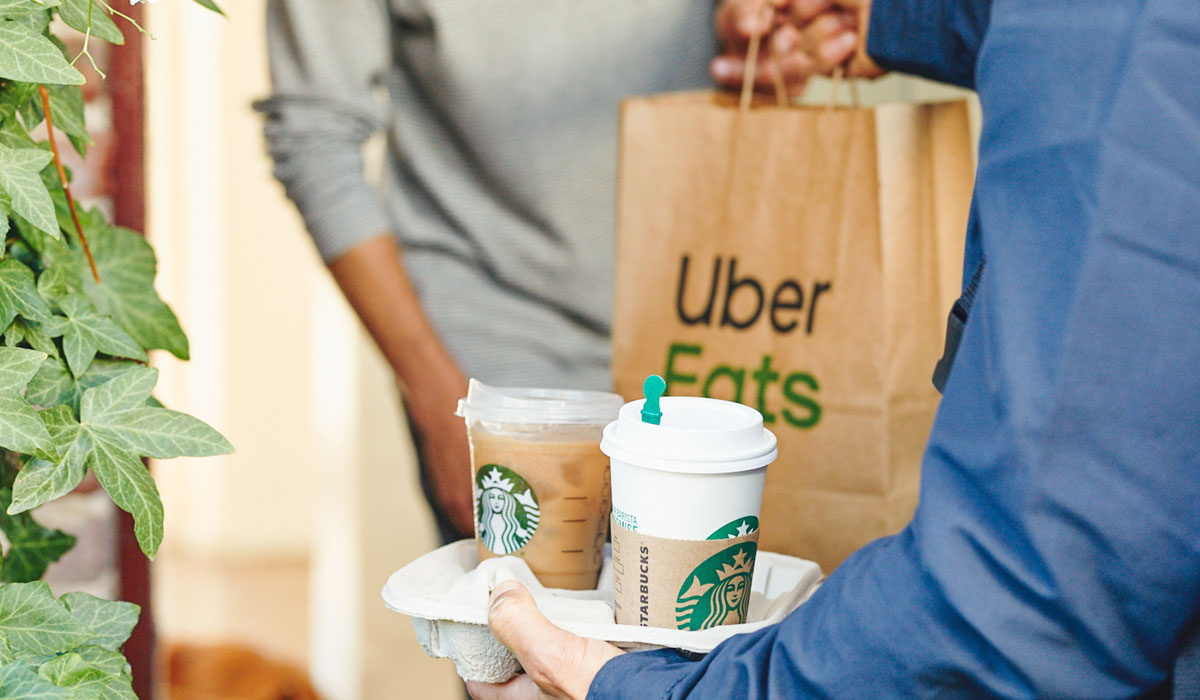The food delivery market is quickly changing, and restaurateurs nationwide are left wondering how this evolution will affect their industry.
On Monday, Uber and Postmates officially announced their $2.65 billion merger, which is scheduled to close in Q1 of 2021.
This means the U.S. third-party delivery market has slimmed from four major players to three, with Uber/Postmates becoming the second-largest behind DoorDash.
According to Second Measure, DoorDash occupied 44 percent of the delivery market in May, followed by 23 percent for Grubhub, 22 percent for Uber Eats, and 8 percent for Postmates. Although Postmates is fourth-largest among its competitors nationally, it holds the biggest market share in Los Angeles with 35 percent.
Uber CEO Dara Khosrowshahi said the deal is expected to “drive significant efficiencies and cost savings” for all sides of the marketplace, including customers and restaurants.
“We believe that over time, we can offer wider selection and lower prices for consumers, generate increased demand, lower costs, streamlined operations with fewer tablets for restaurants, and provide more work opportunities and improved earnings for delivery people,” Khosrowshahi said during a conference call.
However, Lunchbox CEO Nabeel Alamgir says he doesn’t see how the merger will benefit drivers, customers, or restaurants because of the reduced competition.
He views the consolidation as survival mode.
“None of those companies are profitable,” Alamgir says. “… Not only are they not running a sustainable business, I don’t think it’s their plan to run a sustainable business. Their plan is to get to the top of the mountain, and hopefully only two groups are left so they can hash it out then.”
Alamgir explains that the newly merged Uber/Postmates and DoorDash—now the top two players in the market—have different strategies to succeed once they reach said apex.
DoorDash quietly launched its own online ordering system in which it can build native websites and apps for restaurants, which Lunchbox does exclusively.
“DoorDash’s plan is to go not only to third-party ordering, but first-party ordering, as well,” Alamgir says. “ … It’s another signal to the industry that we need to invest in this because consumer sentiment is changing.”
On the other hand, he notes Uber will leverage Postmates’ model in which it delivers not only food, but groceries, electronics, and essentials—an area where Uber is looking to grow.
Khosrowshahi confirmed that strategy.
“So Postmates, we think, is a great step along that vision,” Khosrowshahi said. “Any place you want to go, anything you want to deliver to your home, Uber is going to be there with you. And we think these everyday frequent interactions create habit, create a connection with customers.”
Fees have been a contentious issue for restaurant operators, especially during the pandemic. Restaurants sometimes face fees as high as 30 to 40 percent. In response, several cities—Los Angeles, Chicago, New York City, Washington, D.C., San Francisco, and Seattle—have instituted emergency caps to assist restaurants
“When the delivery becomes everything, you now start thinking as a restaurant owner, maybe I need to start taking the delivery business more seriously and start taking ownership over it,” says Dragontail Systems CEO Ido Levano.
A growing number of restaurants have moved to circumvent fees by establishing direct delivery, which provides valuable customer data. For example, New York-based brand Bareburger said it now owns more than 50 percent of digital orders, up from 14 percent in 2018 and 34 percent in 2019. Others are just getting started—Panda Express announced that it will roll out direct delivery to 2,000 locations by the end of July.
Dragontail Systems CEO Ido Levanon says consumers would rather order from a local restaurant directly as opposed to a third party. The pandemic—which pushed numerous restaurants to add delivery—is accelerating the process.
“When the delivery becomes everything, you now start thinking as a restaurant owner, maybe I need to start taking the delivery business more seriously and start taking ownership over it,” Levanon says. “So I should have my own website, and now with the technology, it’s so much easier.”
Restaurants controlling their digital ordering means avoiding high fees, which in turn hurts the profitability of third-party companies.
In order to combat this loss in revenue, Alamgir says the best thing for delivery brands to do is be more transparent with customer data.
“They all have a deal that they have set up internally—we will not share customer data,” Alamgir says. “They all are friends when it comes to that agreement. So that’s the only thing holding them back. If one partner decides to go ahead and be a little more honest with their customers, I think we’ll see a company that will rise. It could be Uber Eats, it could be either of them, but they’re not showing any sign of being restaurant-friendly.”
With Uber and Postmates merging, another significant consolidation in the U.S. food delivery market is unlikely. Any additional merger would result in two companies controlling substantially all of the share. It’s reportedly a major reason why the Uber/Grubhub deal fell through, although Grubhub CEO Matt Maloney told CNBC it was because Just Eat Takeaway’s $7.3 billion deal was “dramatically better.”
Uber/Grubhub and DoorDash would’ve owned roughly 90 percent, which drew the ire of several members of Congress. A group of Democratic senators sent a letter to Assistant Attorney General Makan Delrahim and Federal Trade Commission Chairman Joseph Simons urging them to monitor negotiations and initiate an investigation if an agreement was reached.
Khosrowshahi said he doesn’t expect another big merger in the U.S., saying there’s enough room for three players to be profitable in food delivery.
“We like our position,” he said. “We’re never satisfied, but we think that this Postmates deal gets us stronger in the U.S. I think it brings a terrific brand, a really strong management team, and the opportunity to increase efficiencies. And we think that it puts us in a very strong position going forward in what is our largest market.”











